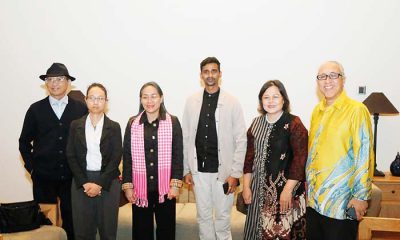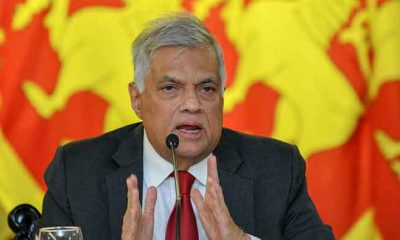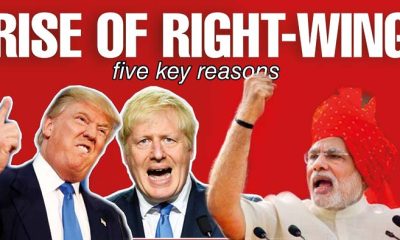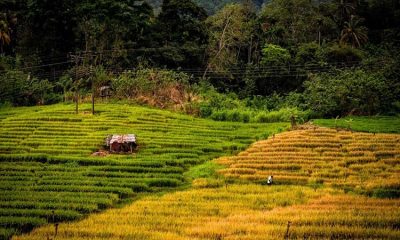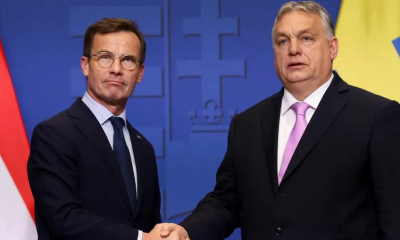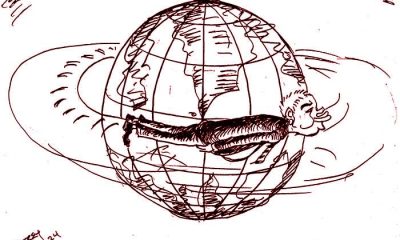Features
Wisdom in Political Insights: My talk with Mahathir Mohamad
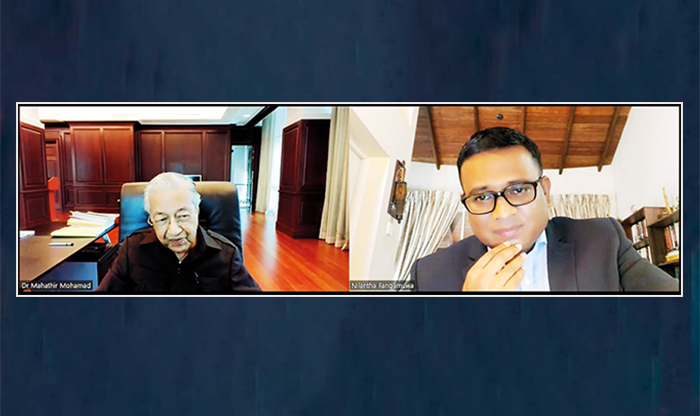
by Nilantha Ilangamuwa
Before we dived into the world of politics, I was eager to learn how he managed his style and which fundamentals he followed to pursue the goal of the common good. I had the privilege of talking via zoom with none other than Mahathir Mohamad, a major force behind Malaysia’s take-off. Before he became an icon in the political arena, Mahathir was a physician, a graduate of the reputed King Edward VII College of Medicine in Singapore. I sought his wisdom on the enduring principles that guide a life and a profession.
As he leaned forward, his eyes reflecting the wisdom of a life well-lived, he shared, ‘If I may speak of my calling as a medical doctor, there is one cardinal principle that reigns supreme – the patient’s well-being. It’s not about profiting from others’ misfortunes but about tirelessly working towards healing. In my practice, I encountered countless individuals grappling with life’s myriad challenges.’
Dr. Mahathir bin Mohamad, a towering figure in Asian politics, held the office of Prime Minister for an astounding 24 years, from 1981 to 2003 and later from 2018 to 2020. He revealed the philosophy that has been his compass throughout this remarkable journey.
‘I lead a life of moderation, avoiding the extremes. For instance, when I eat, I do so in moderation, sufficient for sustenance. My mother’s wisdom echoes in my ears – when food becomes overly delightful, it’s time to stop. Moderation, in all aspects of life, is key. Never veer to the extremes,’ he advised.
Explaining his longevity, he shared, ‘I abstain from smoking and drinking, and I refrain from overindulgence in food. I consume just what is necessary for my vitality.’
Turning to the subject of knowledge, he harked back to his foundational beliefs. ‘Knowledge has eternally held sway. The ancient Egyptians didn’t erect pyramids through divine incantations, nor did the waters flow in the irrigation canals of the Indus Civilization by the ignorance of their laws. Knowledge has perpetually been the font of power and prosperity.’
Mahathir stands as one of the senior-most active politicians in Asia, if not the world, having seen the ascents and declines of countless leaders. When I asked about those whom he admired and those who presented challenges, he said:
‘There are leaders I greatly admire and tried to emulate in problem-solving. Take Nelson Mandela, who endured over 27 years in captivity yet emerged without a trace of bitterness, working hand in hand with his former captors to rebuild South Africa. He exemplified selflessness, prioritizing society over self. Leaders of this caliber endure suffering for the greater good of humanity.’
As for the more trying encounters he encountered during his tenure, he gracefully refrained from singling them out, understanding the potential consequences it could have on individuals and their families.
Q: ‘What, in your view, are the defining qualities of a true statesperson? How does one distinguish a genuine leader from someone who exploits racial or religious elements for power?’
A: ‘A true statesperson is one who places the world and society above personal interests. Even when faced with personal hurt, they remain committed to what is right and beneficial for the common citizen.’
Delving into the impact of nationalism on the process of nation-building, I sought Mahathir’s insights on the pivotal role of nationalism and how he harnessed this concept during his tenure as Malaysia’s leader, even in the face of contentious allegations regarding anti-Semitic rhetoric, favoritism towards the ethnic Malay majority, and the treatment of political opponents.
‘First and foremost, one must cultivate a deep love for one’s country. It’s the place where you were born, raised, and achieved your aspirations; essentially, it’s where your roots lie. This genuine love for one’s nation fosters a sincere desire to contribute to its development. When you hold authentic affection for your country, the thought of causing harm or tarnishing its reputation becomes inconceivable.
‘When individuals feel that their nation is capable of self-sustenance, it instills a sense of pride and responsibility. This sentiment, at its core, embodies the essence of true nationalism. Once a common goal is attained, there arises no inclination to harm the country.’
We then moved to Malaysia’s remarkable economic transformation during his leadership. In 1981, when he assumed office, Malaysia’s GDP stood at approximately 25 billion USD. Under his visionary stewardship, the nation’s GDP burgeoned to a staggering 110.2 billion USD. Many attribute this success to his leadership, despite its association with contentious policies. I asked what underlay this economic triumph.
‘To foster a nation’s growth, stability and peace are imperative. A nation beset by instability and racial tensions cannot thrive. In Malaysia, a diverse and multicultural country, my foremost task was to unite people from various ethnic and religious backgrounds to work together, thereby establishing social stability and peace. Once this foundation is laid, the path is paved for economic growth, attracting new investments, and enabling individuals from diverse fields to flourish professionally.’
On his interactions with Sri Lanka, a country he had visited many times, I couldn’t help but pose a question about how we went wrong compared to Malaysia and Singapore.
Q: ‘You’ve made several visits to Sri Lanka, with your last visit in 2014, when you launched various development projects. At one point, you and your political rival, the late Lee Kuan Yew, emphasized the importance of learning from Sri Lanka’s successes. However, today, Sri Lanka’s path diverges significantly from that of Malaysia and Singapore. What, in your opinion, went wrong in Sri Lanka?’
A: A country’s progress is greatly contingent on its leadership. If the leader is inept, unfocused on authentic national development, or lacks an understanding of what development model suits their nation, regression is inevitable. History is replete with examples of countries that once shone brightly but have since faded.
‘Some nations falter when leaders prioritize personal gain and well-being over the welfare of the nation. Consequently, regression becomes their destiny. The history of every country exhibits cycles of ups and downs, and change is an intrinsic part of a nation’s journey.’
Mahathir’s spirited political debates with the late Lee Kuan Yew of Singapore remain indelibly etched in the annals of history. In a book titled ‘Conversations with Mahathir Mohamad,’ he offered a glimpse into the subject saying, ‘The fact remains that he is a mayor of Singapore. This is something he doesn’t like. He wants to be big, you see, and he feels that we took away his opportunity to lead a real country.’ Conversely, Lee Kuan Yew referred to Mahathir as ‘a thoroughly destructive force. He is a very smart man, but his mentality is still stuck in the 1970s.’
I probed him on those years of political rivalry and the intricacies of their relationship. he recounted, ‘When Singapore merged with Malaysia, it was a nation struggling to find its feet. Emerging from British rule, it had encountered its share of challenges during that period. Lee Kuan Yew saw this merger as his chance to become the Prime Minister of Malaysia. In Malaysia, he believed he could hold a substantial role, akin to a real Prime Minister, whereas in Singapore, he would be more like a mayor.
‘However, he soon discovered that Malaysia was not as welcoming as he had hoped. Ultimately, Malaysia expelled Singapore due to the disruptive political climate he had introduced. The then Prime Minister, Tunku Abdul Rahman, decided that Singapore should no longer be part of Malaysia. Singapore, of course, thrived after its expulsion, but at that moment, Lee Kuan Yew believed he had lost a significant opportunity to become a Prime Minister, which is why he shed tears.’
Responding to Lee Kuan Yew’s characterization of him, he countered, ‘Well, everyone is entitled to their perspective. He viewed me as orthodox, and perhaps he wasn’t entirely wrong. I was deeply concerned about racial relations in Malaysia. We have three major ethnic groups, but their achievements were not on par. The Chinese community had made significant strides and seized opportunities post-independence, while the Malays struggled in business, despite being afforded similar opportunities. This disparity was a persistent obstacle to our nation’s development. My aim was to eliminate these disparities and drive the country toward true development. To some, my methods might have seemed orthodox, but my focus was squarely on bridging the ethnic divides.’
I inquired about reports suggesting that during his tenure as Prime Minister of Malaysia, he had made efforts to secure ASEAN membership for Sri Lanka but faced opposition from certain political quarters in other countries. I asked him to confirm the accuracy of these reports.
‘Indeed, ASEAN is a remarkable success story in the realm of regional cooperation, notably for its ability to reject war in the region for over six decades. While many other nations expressed interest in joining ASEAN, certain factors, such as geographical location, posed obstacles to their inclusion. The organization’s concern was that if it expanded too rapidly, it might become unwieldy. I believed Sri Lanka was a suitable candidate for ASEAN membership, transcending geographical differences. However, other member nations were hesitant to extend the invitation.’
Next we got on to his thoughts on the development of secondary leadership. Often, exceptional leaders, when they depart, leave a void that can lead to political polarization and division. I queried how he, drawing from his decades of political experience and wisdom, fostered secondary leadership in Malaysia and navigated the challenges along the way.
‘When you assume the role of Prime Minister, you wield immense power, and that power can be either a tool for personal gain or an instrument for national progress. I was acutely aware that if I used that power for personal purposes, I would tarnish my legacy and leave a stain on the nation’s history. Instead, I chose to focus on the nation’s development. For me, the enduring satisfaction came from witnessing the country’s growth. That was the only reward I sought, and it was the reward I received from the world through recognition of Malaysia’s development.’
‘During my first term as Prime Minister, which lasted for over 20 years, I realized that it was a lengthy tenure, and I was already in my seventies. I firmly believed that the key to our nation’s progress lay in nurturing a new generation of leaders. I advocated the notion that developing the nation was a prerequisite for individual growth. I encouraged my successors to follow the same path, with the aim of propelling Malaysia to developed nation status. However, once I stepped down from office, subsequent leaders pursued different agendas. They wrongly believed that during my tenure, I had misappropriated government funds, despite the facts pointing to the contrary. Consequently, they began to wield their power for personal interests, derailing the path we had charted since the early ’80s. This regression halted Malaysia’s growth.
This prompted me to re-enter politics. Subsequently, I once again assumed the role of Prime Minister. However, the political landscape had transformed. Certain political parties resorted to exploiting religious and ethnic divisions to disrupt the newly formed government, triggering a series of political crises and eroding political stability. In the past 60 years, we had experienced only four changes in government. However, after my departure in 2020, four different governments came to power, further exacerbating political and social instability.’
Curious about external influences, I asked if external parties played a role in perpetuating this instability. Dr. Mahathir acknowledged the possibility of some external elements but characterized the situation as a complex political crisis that would require time and effort to resolve.
Finally, I posed the question: What he considered to be his biggest mistake during his tenure as the longest-serving ruler in modern Malaysian history. He contemplated deeply and replied, ‘I believe that stepping down from the position of Prime Minister was a significant mistake. However, had I not done so, people would not have had the opportunity to see what kind of government they would get in my absence. It’s often during challenging times that we truly appreciate the value of a nation’s well-being. We must undergo difficult periods to realize that the prosperity of a country is not a permanent state.’
I finally sought Dr. Mahathir’s thoughts on the pressing issues that confront our world today. In this era of multiple crises – from global health emergencies to supply chain disruptions, debates surrounding multi-polarism versus Western hegemony, the rise of the Global South, and China’s aspirations to superpower status – I asked him to convey a message to the global community, one that promotes equity and dignity for all of humanity.
‘In the past, when conflicts arose among small principalities, strong leaders would unite these territories into larger nations, steering them towards development. That was the historical narrative. However, our world has changed significantly. Today, due to the ease of communication, we are not just neighbors with our immediate neighboring countries but with the entire world. This closeness brings with it shared challenges that demand a collective approach. In essence, we require a form of global governance.
‘We have seen attempts at this before, such as the League of Nations, which ultimately faltered. Then came the era of the United Nations, which, unfortunately, is also facing challenges. The United Nations, with its five veto-wielding powers, can sometimes be stymied by the interests of a few. Therefore, it is imperative for the world to forge a unified movement to tackle common global issues, including pandemics, the consequences of climate change, the growing global population, and more. Just as small principalities once came together to form nation-states, now nation-states must unite to create a global governance structure capable of addressing these shared problems.’
As a parting thought, Dr. Mahathir turned his attention to the ongoing conflict in Ukraine. He observed, ‘Europeans still seem to contemplate resolving international conflicts through wars. They had allied with the Russians during World War II to combat Germany, and together they defeated Germany. However, immediately after victory, they designated Russia as a new enemy, leading to the establishment of NATO, focused squarely on Russia.
In response, Russia formed the Warsaw Pact, sparking a prolonged Cold War, which was a considerable waste of resources and time. When Russia eventually decided to dissolve the Warsaw Pact, NATO took a different path. Instead of dismantling itself, it bolstered its capabilities and invited former Warsaw Pact members to join, all directed against Russia. This inevitably fueled a series of conflicts, with the Ukraine conflict being a part of this larger narrative.’
He concluded with a resounding call for change, stating, ‘While NATO nations provide support to the war in Ukraine, it is the Ukrainian people who are fighting and suffering. Allowing Ukrainians to endure this conflict, with lives lost and their nation in ruins, is untenable. The mindset of resolving disputes through warfare must come to an end.’
Features
The heart-friendly health minister

by Dr Gotabhya Ranasinghe
Senior Consultant Cardiologist
National Hospital Sri Lanka
When we sought a meeting with Hon Dr. Ramesh Pathirana, Minister of Health, he graciously cleared his busy schedule to accommodate us. Renowned for his attentive listening and deep understanding, Minister Pathirana is dedicated to advancing the health sector. His openness and transparency exemplify the qualities of an exemplary politician and minister.
Dr. Palitha Mahipala, the current Health Secretary, demonstrates both commendable enthusiasm and unwavering support. This combination of attributes makes him a highly compatible colleague for the esteemed Minister of Health.
Our discussion centered on a project that has been in the works for the past 30 years, one that no other minister had managed to advance.
Minister Pathirana, however, recognized the project’s significance and its potential to revolutionize care for heart patients.
The project involves the construction of a state-of-the-art facility at the premises of the National Hospital Colombo. The project’s location within the premises of the National Hospital underscores its importance and relevance to the healthcare infrastructure of the nation.
This facility will include a cardiology building and a tertiary care center, equipped with the latest technology to handle and treat all types of heart-related conditions and surgeries.
Securing funding was a major milestone for this initiative. Minister Pathirana successfully obtained approval for a $40 billion loan from the Asian Development Bank. With the funding in place, the foundation stone is scheduled to be laid in September this year, and construction will begin in January 2025.
This project guarantees a consistent and uninterrupted supply of stents and related medications for heart patients. As a result, patients will have timely access to essential medical supplies during their treatment and recovery. By securing these critical resources, the project aims to enhance patient outcomes, minimize treatment delays, and maintain the highest standards of cardiac care.
Upon its fruition, this monumental building will serve as a beacon of hope and healing, symbolizing the unwavering dedication to improving patient outcomes and fostering a healthier society.We anticipate a future marked by significant progress and positive outcomes in Sri Lanka’s cardiovascular treatment landscape within the foreseeable timeframe.
Features
A LOVING TRIBUTE TO JESUIT FR. ALOYSIUS PIERIS ON HIS 90th BIRTHDAY

by Fr. Emmanuel Fernando, OMI
Jesuit Fr. Aloysius Pieris (affectionately called Fr. Aloy) celebrated his 90th birthday on April 9, 2024 and I, as the editor of our Oblate Journal, THE MISSIONARY OBLATE had gone to press by that time. Immediately I decided to publish an article, appreciating the untiring selfless services he continues to offer for inter-Faith dialogue, the renewal of the Catholic Church, his concern for the poor and the suffering Sri Lankan masses and to me, the present writer.
It was in 1988, when I was appointed Director of the Oblate Scholastics at Ampitiya by the then Oblate Provincial Fr. Anselm Silva, that I came to know Fr. Aloy more closely. Knowing well his expertise in matters spiritual, theological, Indological and pastoral, and with the collaborative spirit of my companion-formators, our Oblate Scholastics were sent to Tulana, the Research and Encounter Centre, Kelaniya, of which he is the Founder-Director, for ‘exposure-programmes’ on matters spiritual, biblical, theological and pastoral. Some of these dimensions according to my view and that of my companion-formators, were not available at the National Seminary, Ampitiya.
Ever since that time, our Oblate formators/ accompaniers at the Oblate Scholasticate, Ampitiya , have continued to send our Oblate Scholastics to Tulana Centre for deepening their insights and convictions regarding matters needed to serve the people in today’s context. Fr. Aloy also had tried very enthusiastically with the Oblate team headed by Frs. Oswald Firth and Clement Waidyasekara to begin a Theologate, directed by the Religious Congregations in Sri Lanka, for the contextual formation/ accompaniment of their members. It should very well be a desired goal of the Leaders / Provincials of the Religious Congregations.
Besides being a formator/accompanier at the Oblate Scholasticate, I was entrusted also with the task of editing and publishing our Oblate journal, ‘The Missionary Oblate’. To maintain the quality of the journal I continue to depend on Fr. Aloy for his thought-provoking and stimulating articles on Biblical Spirituality, Biblical Theology and Ecclesiology. I am very grateful to him for his generous assistance. Of late, his writings on renewal of the Church, initiated by Pope St. John XX111 and continued by Pope Francis through the Synodal path, published in our Oblate journal, enable our readers to focus their attention also on the needed renewal in the Catholic Church in Sri Lanka. Fr. Aloy appreciated very much the Synodal path adopted by the Jesuit Pope Francis for the renewal of the Church, rooted very much on prayerful discernment. In my Religious and presbyteral life, Fr.Aloy continues to be my spiritual animator / guide and ongoing formator / acccompanier.
Fr. Aloysius Pieris, BA Hons (Lond), LPh (SHC, India), STL (PFT, Naples), PhD (SLU/VC), ThD (Tilburg), D.Ltt (KU), has been one of the eminent Asian theologians well recognized internationally and one who has lectured and held visiting chairs in many universities both in the West and in the East. Many members of Religious Congregations from Asian countries have benefited from his lectures and guidance in the East Asian Pastoral Institute (EAPI) in Manila, Philippines. He had been a Theologian consulted by the Federation of Asian Bishops’ Conferences for many years. During his professorship at the Gregorian University in Rome, he was called to be a member of a special group of advisers on other religions consulted by Pope Paul VI.
Fr. Aloy is the author of more than 30 books and well over 500 Research Papers. Some of his books and articles have been translated and published in several countries. Among those books, one can find the following: 1) The Genesis of an Asian Theology of Liberation (An Autobiographical Excursus on the Art of Theologising in Asia, 2) An Asian Theology of Liberation, 3) Providential Timeliness of Vatican 11 (a long-overdue halt to a scandalous millennium, 4) Give Vatican 11 a chance, 5) Leadership in the Church, 6) Relishing our faith in working for justice (Themes for study and discussion), 7) A Message meant mainly, not exclusively for Jesuits (Background information necessary for helping Francis renew the Church), 8) Lent in Lanka (Reflections and Resolutions, 9) Love meets wisdom (A Christian Experience of Buddhism, 10) Fire and Water 11) God’s Reign for God’s poor, 12) Our Unhiddden Agenda (How we Jesuits work, pray and form our men). He is also the Editor of two journals, Vagdevi, Journal of Religious Reflection and Dialogue, New Series.
Fr. Aloy has a BA in Pali and Sanskrit from the University of London and a Ph.D in Buddhist Philosophy from the University of Sri Lankan, Vidyodaya Campus. On Nov. 23, 2019, he was awarded the prestigious honorary Doctorate of Literature (D.Litt) by the Chancellor of the University of Kelaniya, the Most Venerable Welamitiyawe Dharmakirthi Sri Kusala Dhamma Thera.
Fr. Aloy continues to be a promoter of Gospel values and virtues. Justice as a constitutive dimension of love and social concern for the downtrodden masses are very much noted in his life and work. He had very much appreciated the commitment of the late Fr. Joseph (Joe) Fernando, the National Director of the Social and Economic Centre (SEDEC) for the poor.
In Sri Lanka, a few religious Congregations – the Good Shepherd Sisters, the Christian Brothers, the Marist Brothers and the Oblates – have invited him to animate their members especially during their Provincial Congresses, Chapters and International Conferences. The mainline Christian Churches also have sought his advice and followed his seminars. I, for one, regret very much, that the Sri Lankan authorities of the Catholic Church –today’s Hierarchy—- have not sought Fr.
Aloy’s expertise for the renewal of the Catholic Church in Sri Lanka and thus have not benefited from the immense store of wisdom and insight that he can offer to our local Church while the Sri Lankan bishops who governed the Catholic church in the immediate aftermath of the Second Vatican Council (Edmund Fernando OMI, Anthony de Saram, Leo Nanayakkara OSB, Frank Marcus Fernando, Paul Perera,) visited him and consulted him on many matters. Among the Tamil Bishops, Bishop Rayappu Joseph was keeping close contact with him and Bishop J. Deogupillai hosted him and his team visiting him after the horrible Black July massacre of Tamils.
Features
A fairy tale, success or debacle

Sri Lanka-Singapore Free Trade Agreement
By Gomi Senadhira
senadhiragomi@gmail.com
“You might tell fairy tales, but the progress of a country cannot be achieved through such narratives. A country cannot be developed by making false promises. The country moved backward because of the electoral promises made by political parties throughout time. We have witnessed that the ultimate result of this is the country becoming bankrupt. Unfortunately, many segments of the population have not come to realize this yet.” – President Ranil Wickremesinghe, 2024 Budget speech
Any Sri Lankan would agree with the above words of President Wickremesinghe on the false promises our politicians and officials make and the fairy tales they narrate which bankrupted this country. So, to understand this, let’s look at one such fairy tale with lots of false promises; Ranil Wickremesinghe’s greatest achievement in the area of international trade and investment promotion during the Yahapalana period, Sri Lanka-Singapore Free Trade Agreement (SLSFTA).
It is appropriate and timely to do it now as Finance Minister Wickremesinghe has just presented to parliament a bill on the National Policy on Economic Transformation which includes the establishment of an Office for International Trade and the Sri Lanka Institute of Economics and International Trade.
Was SLSFTA a “Cleverly negotiated Free Trade Agreement” as stated by the (former) Minister of Development Strategies and International Trade Malik Samarawickrama during the Parliamentary Debate on the SLSFTA in July 2018, or a colossal blunder covered up with lies, false promises, and fairy tales? After SLSFTA was signed there were a number of fairy tales published on this agreement by the Ministry of Development Strategies and International, Institute of Policy Studies, and others.
However, for this article, I would like to limit my comments to the speech by Minister Samarawickrama during the Parliamentary Debate, and the two most important areas in the agreement which were covered up with lies, fairy tales, and false promises, namely: revenue loss for Sri Lanka and Investment from Singapore. On the other important area, “Waste products dumping” I do not want to comment here as I have written extensively on the issue.
1. The revenue loss
During the Parliamentary Debate in July 2018, Minister Samarawickrama stated “…. let me reiterate that this FTA with Singapore has been very cleverly negotiated by us…. The liberalisation programme under this FTA has been carefully designed to have the least impact on domestic industry and revenue collection. We have included all revenue sensitive items in the negative list of items which will not be subject to removal of tariff. Therefore, 97.8% revenue from Customs duty is protected. Our tariff liberalisation will take place over a period of 12-15 years! In fact, the revenue earned through tariffs on goods imported from Singapore last year was Rs. 35 billion.
The revenue loss for over the next 15 years due to the FTA is only Rs. 733 million– which when annualised, on average, is just Rs. 51 million. That is just 0.14% per year! So anyone who claims the Singapore FTA causes revenue loss to the Government cannot do basic arithmetic! Mr. Speaker, in conclusion, I call on my fellow members of this House – don’t mislead the public with baseless criticism that is not grounded in facts. Don’t look at petty politics and use these issues for your own political survival.”
I was surprised to read the minister’s speech because an article published in January 2018 in “The Straits Times“, based on information released by the Singaporean Negotiators stated, “…. With the FTA, tariff savings for Singapore exports are estimated to hit $10 million annually“.
As the annual tariff savings (that is the revenue loss for Sri Lanka) calculated by the Singaporean Negotiators, Singaporean $ 10 million (Sri Lankan rupees 1,200 million in 2018) was way above the rupees’ 733 million revenue loss for 15 years estimated by the Sri Lankan negotiators, it was clear to any observer that one of the parties to the agreement had not done the basic arithmetic!
Six years later, according to a report published by “The Morning” newspaper, speaking at the Committee on Public Finance (COPF) on 7th May 2024, Mr Samarawickrama’s chief trade negotiator K.J. Weerasinghehad had admitted “…. that forecasted revenue loss for the Government of Sri Lanka through the Singapore FTA is Rs. 450 million in 2023 and Rs. 1.3 billion in 2024.”
If these numbers are correct, as tariff liberalisation under the SLSFTA has just started, we will pass Rs 2 billion very soon. Then, the question is how Sri Lanka’s trade negotiators made such a colossal blunder. Didn’t they do their basic arithmetic? If they didn’t know how to do basic arithmetic they should have at least done their basic readings. For example, the headline of the article published in The Straits Times in January 2018 was “Singapore, Sri Lanka sign FTA, annual savings of $10m expected”.
Anyway, as Sri Lanka’s chief negotiator reiterated at the COPF meeting that “…. since 99% of the tariffs in Singapore have zero rates of duty, Sri Lanka has agreed on 80% tariff liberalisation over a period of 15 years while expecting Singapore investments to address the imbalance in trade,” let’s turn towards investment.
Investment from Singapore
In July 2018, speaking during the Parliamentary Debate on the FTA this is what Minister Malik Samarawickrama stated on investment from Singapore, “Already, thanks to this FTA, in just the past two-and-a-half months since the agreement came into effect we have received a proposal from Singapore for investment amounting to $ 14.8 billion in an oil refinery for export of petroleum products. In addition, we have proposals for a steel manufacturing plant for exports ($ 1 billion investment), flour milling plant ($ 50 million), sugar refinery ($ 200 million). This adds up to more than $ 16.05 billion in the pipeline on these projects alone.
And all of these projects will create thousands of more jobs for our people. In principle approval has already been granted by the BOI and the investors are awaiting the release of land the environmental approvals to commence the project.
I request the Opposition and those with vested interests to change their narrow-minded thinking and join us to develop our country. We must always look at what is best for the whole community, not just the few who may oppose. We owe it to our people to courageously take decisions that will change their lives for the better.”
According to the media report I quoted earlier, speaking at the Committee on Public Finance (COPF) Chief Negotiator Weerasinghe has admitted that Sri Lanka was not happy with overall Singapore investments that have come in the past few years in return for the trade liberalisation under the Singapore-Sri Lanka Free Trade Agreement. He has added that between 2021 and 2023 the total investment from Singapore had been around $162 million!
What happened to those projects worth $16 billion negotiated, thanks to the SLSFTA, in just the two-and-a-half months after the agreement came into effect and approved by the BOI? I do not know about the steel manufacturing plant for exports ($ 1 billion investment), flour milling plant ($ 50 million) and sugar refinery ($ 200 million).
However, story of the multibillion-dollar investment in the Petroleum Refinery unfolded in a manner that would qualify it as the best fairy tale with false promises presented by our politicians and the officials, prior to 2019 elections.
Though many Sri Lankans got to know, through the media which repeatedly highlighted a plethora of issues surrounding the project and the questionable credentials of the Singaporean investor, the construction work on the Mirrijiwela Oil Refinery along with the cement factory began on the24th of March 2019 with a bang and Minister Ranil Wickremesinghe and his ministers along with the foreign and local dignitaries laid the foundation stones.
That was few months before the 2019 Presidential elections. Inaugurating the construction work Prime Minister Ranil Wickremesinghe said the projects will create thousands of job opportunities in the area and surrounding districts.
The oil refinery, which was to be built over 200 acres of land, with the capacity to refine 200,000 barrels of crude oil per day, was to generate US$7 billion of exports and create 1,500 direct and 3,000 indirect jobs. The construction of the refinery was to be completed in 44 months. Four years later, in August 2023 the Cabinet of Ministers approved the proposal presented by President Ranil Wickremesinghe to cancel the agreement with the investors of the refinery as the project has not been implemented! Can they explain to the country how much money was wasted to produce that fairy tale?
It is obvious that the President, ministers, and officials had made huge blunders and had deliberately misled the public and the parliament on the revenue loss and potential investment from SLSFTA with fairy tales and false promises.
As the president himself said, a country cannot be developed by making false promises or with fairy tales and these false promises and fairy tales had bankrupted the country. “Unfortunately, many segments of the population have not come to realize this yet”.
(The writer, a specialist and an activist on trade and development issues . )


